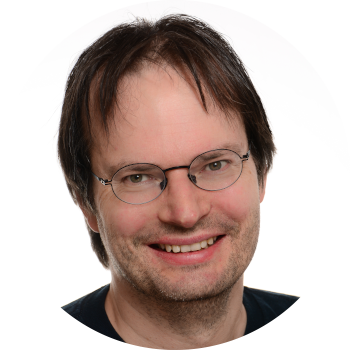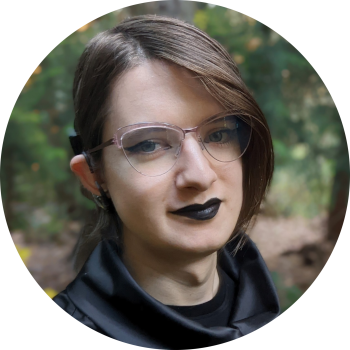
The Haskell Foundation Executive Team reports to the Board of Directors and manages the day to day work of the Foundation. They interpret the Board's priorities, research solutions, and work with the community to execute of the Foundation's mission.

Jose Calderon’s background is split between industrial R&D at Galois, Inc. and Computer Science instruction at the University of Maryland. His research has focused on the implementation of programming languages for privacy-preserving technologies, high-assurance deployments, and the implementation of lazy functional languages. Much of his work leveraged Haskell as the implementation language of choice, though he has used OCaml, Racket, and C professionally. At the University of Maryland Jose taught the Systems Programming, Programming Languages, and Compilers courses.
The Haskell Foundation board of directors are responsible for managing and setting the direction of the Haskell Foundation.

Andres has been active in the Haskell community for more than 20 years. His contributions include editing the Haskell Communities and Activities reports, (co-)organising hackathons, meetups and conferences, serving on the haskell.org board and maintaining a number of Haskell tools and libraries. He is a partner at Well-Typed LLP, the first specialist Haskell consultancy. He has a PhD from Utrecht University on generic programming in Haskell.

More often known as Bodigrim, Andrew is an extremely active Haskell community member, library author and maintainer, speaker and mentor. He has made strides towards cleaning out backlogs for bytestring, text, unix, random, and vector, which were previously stalled. Andrew holds a PhD degree for contributions to the theory of the Riemann zeta-function and develops a range of mathematical packages with a focus on performance.

Avi Press is a developer tool author, Haskell enthusiast, and the founder/CEO of Scarf, which has been proudly running Haskell in production since 2019. Avi has been avidly using Haskell since 2014 and also currently serves on the Haskell.org committee. He is an advocate for open source broadly, as well as for better data-sharing initiatives within the open source community.

Emily is an advisor and engineer focused on language and systems development at Kadena. She helped found the Haskell Foundation as the first chair of its working group, and on its executive team as CTO. Before Haskell, she worked in finance on statistical models and technical audit on Wall St., and moonlighting as a mathematician. At some point, she decided Category Theory was a good idea to marry with programming, and found the Haskell community was already on it, opting to get her hands dirty on the Haskell.org committee, the Core Libraries Committee, and maintaining/authoring too many packages. She has since published a paper on the mathematics of optics, and, as a coping mechanism, is now working on applied subjects to regain her ability to interact with humans.

Graham is Professor of Computer Science at the University of Nottingham, where he leads the Functional Programming Lab. He’s been involved in Haskell research and education for many years, and has served as an editor of the Journal of Functional Programming, vice-chair of the ACM Special Interest Group on Programming Languages, steering committee chair of the International Conference on Functional Programming, and program chair of the Haskell Symposium. The second edition of his book “Programming in Haskell” was published by Cambridge University Press in 2016.

Hazel spends her days working on building out teams of humans as well as infrastructure, systems, automation, and tooling to make life better for others. She’s worked at a variety of companies, across a wide range of tech, and knows that the hardest problems to solve are the social ones. One of her favorite things is watching someone light up when they understand something for the first time, and a life goal of hers is to help as many people as possible experience that joy.
Hazel has spoken at conferences about her work in open source, and is the creator of the “setup” GitHub Action for Haskell. She brings a passion for developer experience, empathy, and continuous collaborative improvement to everything she does. She also loves swing dancing, both as a leader and a follower.

Jasper encountered Haskell just as he started university, and was completely smitten by the language. He went on to spent most of his student days working on various open source Haskell projects. After graduating, he worked for several companies using Haskell in production. He then started to contribute to the community, chairing the Haskell.org foundation and growing ZuriHac into a world-class event. He currently works in the cloud & software security field.

Josh is a member of the GHC team working at IOG, focusing on the JavaScript backend and has a background of working with parallel numerics code on the Accelerate project.

Michael is an engineer working at CircuitHub, with experience in programming languages, developer tooling, program analysis, and industrial R&D. He is also one of the maintainers of the Haskell Language Server. Michael has a keen interest in developer experience, and hopes to polish a few more rough edges off the Haskell diamond.

Mike codes as a hobbyist and has been interested in programming since his childhood in the late 1970s. He first encountered Haskell in 2013 and was immediately impressed by its mathematicality. It has been his sole coding focus since then. Today, Mike is an active maintainer of the ansi-terminal package and the Stack project, and makes ad hoc contributions to other Haskell projects. Mike is a chartered accountant by profession and a Senior Managing Director in the Economic and Financial Consulting practice of FTI Consulting.

Richard has a long track record of contributing to Haskell (GHC, in particular) since 2012, including many publications pushing the boundaries of what Haskell can accomplish. He implemented -XTypeInType and -XTypeApplications, has done considerable work on the constraint solver, type checker, and core language representations in GHC. He is also the author of singletons, serves on the GHC Steering Committee, and was an early member of the HF working group, driving the development of its initial technical agendas. He has been chair of the Haskell Symposium and Haskell Implementors’ Workshop. Richard currently works at Jane Street as a compiler engineer, and enjoys thinking about taking Haskell ideas into OCaml and OCaml ideas into Haskell.

Founder of Obsidian Systems, organizer for the NY Haskell User Group, 3-time Haskell.org Board Member and treasurer since its incorporation. Ryan has both personally helped the HF with its fundraising and made in-kind contributions through Obsidian to the HF’s web dev track.

Simon is an Engineering Fellow at Epic Games. Until 2022, he was a researcher at Microsoft Research in Cambridge, England, where he started in Sept 1998. He’s also an Honorary Professor of the Computing Science Department at Glasgow University, where he was a professor during 1990-1998. Simon is interested in the design, implementation, and application of lazy functional languages. He was one of the original designers of Haskell, and much of his work is focused around the Glasgow Haskell Compiler and its ramifications. Simon is also chair of Computing at School, the group at the epicentre of the reform of the national curriculum for Computing in England. Computer science is now a foundational subject, alongside maths and natural science, that every child learns from primary school onwards.

Designer and maintainer of Opaleye, who is currently a software engineer with Groq, with a Ph.D in mathematics (probability theory).
